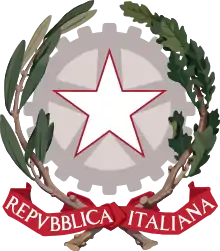Public holidays in Italy
The following days are public holidays in Italy:[1]
| Date | English Name | Local Name | Remarks |
|---|---|---|---|
| 1 January | New Year's Day | Capodanno | |
| 6 January | Epiphany | Epifania | |
| Sunday after the first full moon following the spring equinox | Easter Sunday | Pasqua | |
| Monday after Easter | Easter Monday | Lunedì dell'Angelo, Lunedì in Albis or more commonly Pasquetta | |
| 25 April | Liberation Day | Festa della Liberazione | Liberation from Fascism and Nazi occupation, 1945 |
| 1 May | International Workers' Day | Festa del Lavoro (or Festa dei Lavoratori) | |
| 2 June | Republic Day | Festa della Repubblica | Birth of the Republic, 1946 |
| 15 August | Assumption Day | Assunzione (Ferragosto) | |
| 1 November | All Saints' Day | Tutti i santi (or Ognissanti) | |
| 8 December | Immaculate Conception | Immacolata Concezione (or just Immacolata) | |
| 25 December | Christmas Day | Natale | |
| 26 December | Saint Stephen's Day | Santo Stefano |
In addition each city or town celebrates a public holiday on the occasion of the festival of the local patron saint: for example, Rome - 29 June (SS. Peter and Paul), Milan - 7 December (S. Ambrose).[2] In South Tyrol, the holiday is instead on Whit Monday (which is also a public holiday in North Tyrol and the rest of German-speaking Europe).
Public holidays and local saints' days are not transferred when they fall on a weekend. The number of working days given over to public holidays therefore varies year by year.
The following days are not public holidays, but are nevertheless established by law:
| Date | English Name | Local Name | Remarks |
|---|---|---|---|
| 7 January | Tricolour Day | Festa del tricolore | Flag day made a national day by law no. 671 of 31 December 1996. |
| 27 January | International Holocaust Remembrance Day | Giorno della Memoria | Made a national day by law no. 211 of 20 July 2000.[3] |
| 17 March | Anniversary of the Unification of Italy | Anniversario dell'Unità d'Italia | Only in 1911, in 1961 and in 2011 for the 50th, 100th and 150th anniversary. |
| 4 November | National Unity and Armed Forces Day | Giorno dell'Unità Nazionale e Festa delle Forze Armate | A public holiday from its inception in 1919 till 1977, the anniversary of the end of warfare between Italy and Austria-Hungary included in the Armistice of Villa Giusti. |
References
- "Festività nazionali in Italia" (in Italian). Italian Embassy in London. Retrieved 15 April 2012.
- "Festività nazionali in Italia" (in Italian). Governo Italiano - Dipartimento per il Cerimoniale dello Stato. Retrieved 25 April 2013.
- "L. 20 luglio 2000, n. 211 (1) Istituzione del "Giorno della Memoria" in ricordo dello sterminio e delle persecuzioni del popolo ebraico e dei deportati militari e politici italiani nei campi nazisti" (PDF). MELA (in Italian). 30 July 2000. Retrieved 3 January 2020.
This article is issued from Wikipedia. The text is licensed under Creative Commons - Attribution - Sharealike. Additional terms may apply for the media files.
